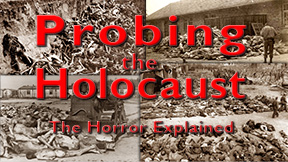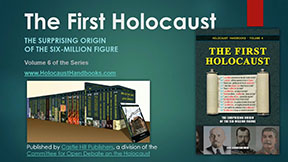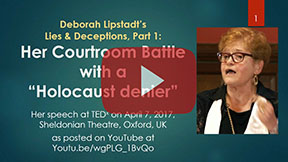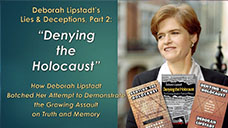In winter 1989/1990, one of Germany’s most prominent historians publishes an article in a tiny monthly newspaper addressing this American gas chamber expert report. Our student reads with amazement that this report is apparently taken seriously by the mainstream historians, or at least by this one. Though this historian does not agree with the report’s statements, he agrees that it poses some serious questions for historiography to be answered, and that further research is necessary.
In a letter to the editor which is printed in the next issue of this newspaper, our student picks up the topic and lists four topics that need to be addressed before any statements made by this gas chamber export report can be accepted as correct:
“1. This report does not make clear what the actual conditions of the ruins of the alleged gas chambers are. It also needs to be verified if the building material found at these places today is authentic and has not been altered.
2. Before any analysis make sense, it needs to be established beyond any doubt whether the chemical compounds analyzed could have survived 45 years of exposure to the environment.
3. Next it needs to be found out if Prussian Blue could have developed in the homicidal gas chambers in the first place.
4. Finally, it needs to be established what amount of cyanide residues has to be expected in the homicidal gas chambers under the circumstances as testified to by the witnesses and as it is compatible with the physical evidence and the technical possibilities.”
A few days after the article was published, our young chemist receives a phone call. The caller is curious if the young chemist intends to do the research he has outlined in his article.
“Not right now. I am currently spending my compulsory year at the German Air Force, which means I have no time and resources to do anything. But I might do some research later.”
“I have a list of persons who are interested in the results of any research you might come up with in future. Do you want me to send the list to you?”
“Sure, go ahead”.
A few days later he receives the list. All names except for one – the German government Institute for Modern History – are unknown to him. But this will change, because a few of the people on this list will change his life forever, in just a few years…
Change of Scene
Erich finds some great books on German constitutional criticism. The authors of these books rip the German Basic Law, Germany’s substitute constitution (Germany has no constitution, but only a Law imposed on Germany by the victorious powers). One books comes from a right-winder, the other one from a libertarian, and a third seems to be just a legal expert without any particular political leaning.
“The whole thing is just a bunch of worthless blabber. They really made a patch up job after the war when putting something together,” Erich means during one of their conversations out at Hoechst Castle.
Though it is fun thinking radically to the roots of a problem, our student feels a bit uncomfortable with this radical critique of the holy German Basic Law:
“You know, I wonder what normal people think what we are doing here. The Basic Law is a holy cow in Germany. Criticizing the authorities is something bad already, but sawing on the constitution is consider to be devil’s work.”
“Uh, petty bourgeois! Just look at the facts!”
Their discussion addresses various aspects of German constitutional law, when our student suddenly changes course:
“Look at section 139 of the German Basic law. It says that all legal regulations enacted for the liberation of the German people from National Socialism and militarism are untouched by this basic law. Now think of it for a second. I do not know how many regulations the allied powers enacted after the war, but it sure includes an awful lot of injustice, as we both know. That stinks.”
More than legal considerations of the formal law, our student is worried about the constitutional reality, which, in his eyes, deviates massively from the written law. In this more and more radically tolerant society, there seems to be no tolerance for anybody who wants to organize patriotism democratically. And not to talk about those dissenting about hot historical topics, particularly the Holocaust. He feels increasingly uncomfortable with this situation. Over the last six months, he has seen doubts grow in his mind and heart, and not because he had sought it actively, but because he had tumbled over these two books by pure chance. Now he does doubt, and there is no way of suppressing it. But at the same time, he feels that it is evil to doubt. All of his life he was raised and educated to opine that those doubting or denying the Holocaust are evil persons, fruitcakes and crooks at best, fascists, neo-Nazis, and anti-Semites at worst. Of course, nobody wants to be labeled this way, but then again, he is used to be confronted with these ridiculous sweeping accusations of being a “Nazi” just because one does not submit to radical left-wing ideas. Facing this new wave of unjust accusations lying in his future should he start expressing his doubts, he knows that this evil witch-hunt vocabulary will not stop him. It will only make him even more mad at this screwed up society that seems to be totally brainwashed and to follow nothing more the Pavlovian reflexes. And yet, there is this unsolvable conflict in his heart of doubting, not being able to stop it, and feeling guilty for doubting. It makes him mad that he was raised this way by a society that otherwise encourages criticism and doubt.
Change of Scene
A week later, our student visits his parents. After seven months of pondering over his thoughts, trying to understand his doubts, and suffering under his guilt feeling, he cannot hold it back anymore. He wants to talk.
“I don’t think that our constitution is worth the paper it is written upon” he starts a conversation that is bound to derail right at the beginning. Germans do not accept any criticism of their constitution. Who does it is an enemy of the State by definition.
“I beg your pardon?” replies his mother. “What the heck are you talking about?”
“It does not grant me the basic human rights.”
“That is bullshit. Of course it does!”
“No, it does not. It does not allow me to doubt, and all I want is simply the right to doubt, anything I want!”
“So, who prevents you from doing this?” asks the father.
“Very easy, I show you who: I want to have the right to doubt that there were any gas chambers in the Third Reich” the student son insist.
“When this is your attitude, you will have to leave this house and are not allowed to ever come back!” responds his father in a very aggressive tone.
“There you have it. I told you. It isn’t worth the paper it is written upon” repeats the son. The mother turns against her husband:
“This is my house and I decide who is welcome here and who is not!”, which pretty much muffles the conflict.
“What kind of a society is it that ostracizes or even punishes people just because they have doubts about something? I was told all of my life that being critical about everything is good, that one should not take for granted everything that the powers that be are telling us,” the student insists, but his mother makes it clear that nobody wants to discuss this any further.
“You all want to force me to believe, but I have doubts! And besides, I do not want to believe, I want to know!”
But his father has already left the room and his mother sits at the other end of the room, looking away. An abyss opens between the son and his parents. It is hard to understand for the son how her mother, who has always been so close to him and with whom he could talk about anything, would suddenly refuse any communication.
A few days later, she states:
“I do not have all the knowledge that you have, I haven’t read all the books you read, and have done no research on anything, and I also will not do all what you have done to catch up with you. I simply think and feel that you are wrong. And because I have no arguments to hold against you, I refuse to discuss this with you.”
This statement of dogmatism that could stem from the mouth of the Holy Inquisitor accusing Galileo Galilee flabbergasts her son, and he goes mute.
Change of Scene
Spring 1990. Our student spends a lot of time with his buddies in Frankfurt, though any involvement in the new conservative party has collapsed due to dogmatic inflexibility of the party leaders. The service at the army is boring to a degree that only half an hour of the eight hours of daily service is filled with any kind of activity. The rest is just waiting, a senseless waste of time. But not so for our student. He carries several books to the barracks every day: politics, history, philosophy. What is a dumb-down time for all the other draftees, is the intellectually most inspiring time of his life. He simply uses the time his fatherland grants him to learn and read what he always wanted to. He is called “professor” by the other soldiers, which he considers to be a compliment. Then it is decision time:
“Well, now that I have a concrete PhD offer from both Stuttgart and Mainz, both topics quite difficult, the Stuttgart one even esoteric, which do I go for. Stuttgart? With her around the corner? Isn’t it a bit embarrassing to admit that I make my decisions with my testicles instead of with my brain? Well, who cares. Stuttgart.”
A week later, the entire regiment of draftees travels to the State’s capital Wiesbaden to visit the State parliament. This is called Citizen Education. So they all sit in the spectator ranks while a heated debate about education politics is raging in the parliament. The Christians want to keep the diversified public school system, offering different teaching levels for differently talented children, whereas the leftists and Marxists want to put away with this system and replace it with just one school for everybody. To justify this, one of the Marxists climbs to the podium and starts his speech, slowly reaching its climax:
“We all know on which ideology those Christians base their view that we need a variety of schools. It is the ideology that claims that people are not equal, that they are different by genetic heritage. This is the old Social-Darwinist theory of which we all know where it ended: It ended in the gas chambers of Auschwitz.”
Our soldier student feels like he was just struck by a lightning. Did he really hear that? He did indeed. The education of our children is the most important investment a country can possibly make, and this idiot throws in the Auschwitz Bludgeon to stifle people who dissent with him? What a demagogy! But who is really surprised about it? Auschwitz solves all problems. Who ever can apply it most effectively has the superiority. That was that. Something has to be done to stop that shit, he thinks to himself.
Change of Scene
Stuttgart, end of 1990. Of course, the relationship with this gorgeous high school girl falls apart after only a few weeks, and so our student sits in this great institute for solid state research with a broken heart. He doesn’t want to go home to his empty room with its abyss of loneliness. Then he suddenly has the idea:
“Hey, here I have all the resources I need to do the research on this gas chamber expert report as outlined in my letter: library, online databases, and even secretarial assistance! Heart, what do you want more? And I have plenty of time too, and a good reason to focus on something that really distracts me. What a providence! Well, very often woman are the driving engines behind great discoveries and inventions, so let’s do some really relevant research here!”
Thus, he spends ten hours daily with his PhD thesis and some four to six additional hours at night in order to figure out the chemistry of hydrogen cyanide in building materials in all details. Life makes sense after all!
Change of Scene
Four months long he does not achieve a lot, neither for his PhD, nor with his occasional private research. All he tries to find is some scientific source proving that Prussian Blue is really extremely long-term stable. Four month of online database and literature studies, and nothing. But then, one day, while sitting together with the librarian searching all sorts of databases with various keywords, something pops up:
“Wait a minute. Scroll back one line… It is a study on long-term stabilities of several inorganic pigments, one of them apparently Prussian Blue. That looks just perfect. Can you please order this article? How long will it take?”
“Well, we have to order it from England, so it might take a month or so.”
Finally, in April 1991, the article arrives. It is a direct hit. A 21 year lasting study of Prussian Blue pigment exposed to harsh environmental conditions. Result: No noticeable decay.
“So it survives wind and weather just as well as the wall itself. That is the first step. We are getting somewhere here. And this article has further references. Great! Now let’s see if we cannot live this up!”
He makes photocopies of this article, writes a brief explanation of the content and its implications, understandable for layman, and mails it out to all addresses on the address list he had received roughly a year ago.
Change of Scene
The mail-out of this article changed his life. Suddenly he is in the center of attention of many people, none of who he had ever heard of before. Most of them academics of different walk of lives, but all highly skeptical regarding the Holocaust. The other side in this argument, the established historians, does not seem to care. Nobody of them contacts him, not even a reception notice by the German official Institute for Modern History. How indicative.
One person to who our student is introduced by the gentleman, who sent him the address list more than a year ago, is an engineer who wants to help making further studies, even helping to build an experimental gas chamber to expose material samples to gas. Our student is invited to this engineer’s farmhouse somewhere in deepest lower Bavaria, tucked away in nowhere-land. A close friendship begins, a productive symbiosis to solve many architectural and technical questions our chemistry student never could have coped with by himself.
Another gentleman invites him to Frankfurt to discuss things further. Because this is a welcome opportunity to see Erich again who still resides in Frankfurt, our student agrees to come. The meeting takes place in July 1991. It turns out that the gentlemen is negotiating on behalf of a defence attorney who is looking for a chemist to prepare an expert report to be introduces in several pending court cases. The offer is as follows: They organize and finance a journey to Auschwitz as well as pay all expenses incurred by the collecting and analysis of material samples taken. The student defines the project scientifically, and they give all the logistic support he needs. Additionally, the student must agree to write a report, to permit its use in court, and to eventually publish it. Having this great opportunity to go to Auschwitz himself and do the research, which this American expert had kind of botched, in a proper way intrigues our student so much that he accepts. As a date to travel east, the 15th of August is greed upon.
It is not even so much the chemical side which is the most intriguing part of it all. It is more to understand the actual condition of the alleged gas chambers. He wants to see them. Though he has studied all the materials he could get about them, he still has no exact idea about the condition of the camp’s former crematoria, in which the alleged gas chambers were located. He has therefore no idea whether it would actually be useful to undertake technical or chemical research in the first place.
Before traveling to Auschwitz, he prepares himself thoroughly as to what he will expect with respect to the material remains of the gas chambers, if the generally accepted reports of the mass gassings in Auschwitz were correct. It is clear to him, for example, if one was to believe the eye-witnesses, that the roofs of the morgues of crematoria II and III should show three or four holes through which Zyklon B was to have been thrown into the room. He is unable to find out whether those holes allegedly exist or not. He wants to find that out first. Because if those holes do not exist, then these room were never used as claimed by eyewitnesses.
On August 16, 1991, our student arrives at Auschwitz, and the first thing he does when entering the Birkenau camp is to walk straight over to crematory no. II. He climbs on top of the roof of the crematory’s morgue no. 1, which is usually designated as the gas chamber where the most mass-murders of the Third Reich were said to have taken place. The roof is in various stages of collapse and yet still holds together, partially resting on supporting columns.
And he can find no trace of these holes.
That is when he suddenly stands still for a few seconds, closes his eyes, turns his face to the sky, and opens his mouth to a silent scream. His new friends who accompany him wonder what this is all about.
“Do I live in a world of madmen?”
That is all that he can mumble at this moment.
This very moment on August 16, 1991, our student’s world-view collapses, and he swears to do whatever necessary to advance clarification to this complex of questions. He swears that he will only abandon his position when his doubts are confirmed or rejected through convincing scientific arguments in a fair scientific discourse. Use of force will never change this position. On the contrary: it fortifies his conviction that he is right, because only he who lacks arguments must use force.
Change of Scene
A year later, to his mother’s 51st birthday, he visits his parents, introducing his first girlfriend to them – and his expert report, bearing a dedication to his parents.
“Under no circumstances do I want to see my name in this!” insists his mother, who is quite shocked to see such a work in the first place.
“Well, I thought you’d like it. I worked so hard for it.”
“No way. And why do you have to do what you are doing in the first place? Can’t you see that it is the most dangerous intellectual activity you could possibly pursue? I do not want my son to get in trouble. And for Christ’s sake, it isn’t worth it, because who cares about it anyway? It simply is of no importance for our world! It doesn’t play any role in our society!”
Stunned by the internal paradox of this statement, the son cannot hold it back:
“So you are saying that what I am doing is the most dangerous thing, obviously because those in power would do everything to stop me, because, as you say, they all think that it doesn’t matter at all, is of no relevance and doesn’t play a role in their power schemes? The sun is hot because it is cold, right?”
That is not the way one should spend birthdays. So he drops the issue.






